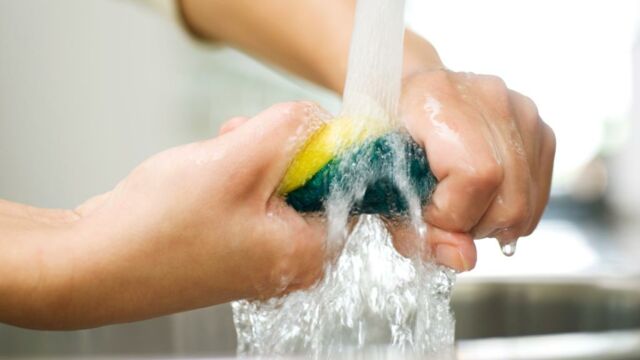We’ve grown accustomed to using that same old kitchen sponge that’s lying at the corner of our sink to wash the dishes we eat in. That same old kitchen sponge is used for weeks on end and the only time we think about replacing it is when it is visibly deteriorating.
Discover our latest podcast
This is a habit all of us should get rid of as thousands of billions of bacteria often thrive in this menial daily utensil.
Despite the fact that everyone uses a kitchen sponge, very few of us really know how often we should change it to avoid health risks. Luckily for you, we’ve got a scientifically-backed answer to the question right here.
How dirty is your kitchen sponge

Let’s start with a rather worrying figure. According to the CSC, also known as the French Consumer Safety Commission, your kitchen sponge is dirty after two days of usage. Yes, that’s right. The message, which was relayed by Côté Maison, says that, in that time, up to 50 billion bacteria, per square centimetre, are living on your kitchen sponge.
How to wash your kitchen sponge
Therefore, the CSC recommends that you wash and disinfect your sponge every two days. Here are a few ways you can do that:
- Lather it up and rinse with water
- Disinfect using white vinegar or baking soda
- Put it in a washing machine at 60°C
- Soak it in a bowl of water that is mixed with lemon juice (known of his antibacterial properties)
It is also important to rinse your sponge well between each and every use. Be careful not to leave it on a damp surface for too long once it is used.
Read more:
⋙ Olive oil: 3 mistakes you make with olive oil in the kitchen
⋙ 5 kitchen hygiene mistakes to avoid at all cost
⋙ Three ways you can re-use coffee grounds in your kitchen
How often should you change your kitchen sponge?

Now, just because you wash your kitchen sponge doesn’t mean you can use it eternally. According to a study published in the journal Scientific Reports, it would be necessary to throw away and replace your kitchen sponge every week! The study authors write:
From a long-term perspective, sponge sanitation methods do not appear to be sufficient to effectively reduce the bacterial load in kitchen sponges and may even increase the bacterial shares. We therefore suggest instead regular (and easily affordable) replacement of kitchen sponges, for example, on a weekly basis.
How to know when to replace your kitchen sponge
As a general rule of thumb, it is recommended that you discard your sponge if it has any of these worrying characteristics:
- If it crumble or breaks
- If it no longer absorbs water properly
- If it changes colour or has a foul smell
- If it regularly used to clean greasy dishes
This article has been translated from Gentside FR.















